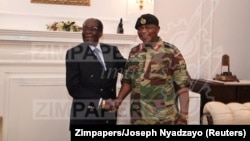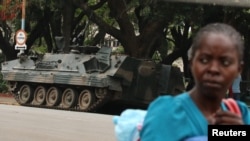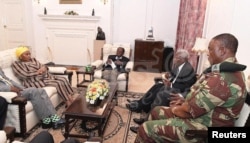Zimbabwe’s President Robert Mugabe made a public appearance Friday, his first since the military took over state institutions and opened talks aimed at getting the aged leader to resign.
Mugabe, wearing a blue and yellow academic gown, presided over a university graduation ceremony for more than 1,000 students in Harare. The president appeared to fall asleep at times and said nothing about the ongoing political uncertainty.
Mugabe, 93, is reported to be resisting demands from the army and members of his own ZANU-PF party to step down after 37 years in power.
The Zimbabwe Defense Forces seized key state institutions on Wednesday, confined President Mugabe to house arrest and clamped on what they termed thieves surrounding the president, including Professor Jonathan Moyo, Home Affairs Minister Ignatius Chombo, Local Government Minister Saviour Kasukuwere, ZANU-PF Youth League secretary Kudzanayi Chipanga and several others.
The detainees, who are in army barracks, are said to be members of a faction of the ruling party that were seeking to elevate first lady Grace Mugabe to the post of vice president. President Mugabe fired his longtime ally, Emmerson Mnangagwa, from the position on November 5.
Opposition demands intensify
Members of opposition groups are expressing frustration with the pace of negotiations over Mugabe’s political future and have called for a mass protest in Harare on Saturday.
Christopher Mutsvangwa, chairperson of the Zimbabwe National Liberation War Veterans’ Association, told journalists that the planned protest is designed to push the president out of office.
Jacob Ngarivhume of opposition group Transform Zimbabwe said hopes of Mugabe leaving office are slowly dissipating.
“There is no way he should be allowed to continue holding power,” Ngarivhume told VOA’s Zimbabwe service. “If he were to do that, then Zimbabwe would be in trouble. What I see happening is there might be a dragging on of the discussion around his departure, but eventually…. he must go. He has outlived his usefulness.”
Former prime minister Morgan Tsvangirai, who leads the Movement for Democratic Change party, joined the calls for Mugabe to resign.
“Mr. Robert Mugabe must resign, step down immediately in line with the national sentiment and expectation, taking full regard of his legacy and contribution to Zimbabwe, pre and post Zimbabwe,” said Tsvangirai, who returned to the country this week from South Africa, where he is being treated for cancer.
U.S. Secretary of State Rex Tillerson said Friday now is the time for the southern African country to return to civilian rule.
"Zimbabawe has an opportunity to set itself on a new path: one that must include democratic elections and respect for human rights," Tillerson told African ministers and diplomats before a meeting in Washington. "Ultimately, the people of Zimbabwe must choose their government," he added.
Mugabe hanging on
There has been no indication Mugabe will voluntarily give up power. Nick Mangwana, who is the Britain-based representative of ZANU-PF, told VOA that, "President Mugabe remains President Mugabe as of now.”
Mugabe is the only leader the nation has known since Zimbabwe won independence in 1980, and has turned back many previous challenges to his rule, often using the army, police and physical violence from supporters to intimidate opponents.
His hold appeared strong even as Zimbabwe’s economy, which has struggled for years, suffered a new downturn over the past 12 months. Last December, the ruling ZANU-PF party nominated him as its presidential candidate for the 2018 elections.
The turning point was the firing of Mnangagwa, 75, a liberation war hero who maintains strong support among veterans.
Mnangagwa’s current whereabouts are uncertain, though he is widely believed to be in South Africa.
As for the president, the Zimbabwe Defense Forces said Friday it is “currently engaging with the commander-in-chief, President Mugabe, on the way forward and will advise the nation as soon as possible.”
Gibbs Dube and Anita Powell contributed to this story.






